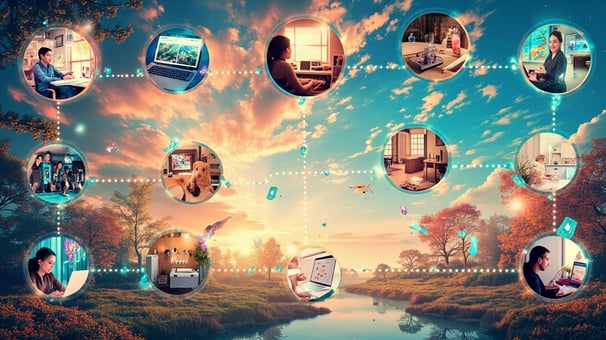Revolutionizing Business with Technology Insights
Explore AI, blockchain,FinTech and cybersecurity innovations for E-commerce and investing success.
Trusted by industry leaders worldwide.
★★★★★
Dropshipping
These platforms offer user-friendly interfaces, reliable suppliers, and essential tools to help beginners succeed in dropshipping.
Here's how it compares to other popular dropshipping platforms:
SaleHoo is ideal for those seeking a reliable supplier directory and market insights.Salehoo platform that connects users with over 8,000 pre-vetted suppliers and more than 2.5 million products.
Doba: Doba offers a broader range of features, including real-time inventory updates, automated monitoring, and extensive integrations with platforms like Shopify, Amazon, and eBay. SaleHoo lacks advanced automation and diverse integrations, focusing more on wholesale suppliers
AutoDS: AutoDS is an all-in-one dropshipping platform that automates product sourcing, order fulfillment, and price monitoring. It provides a seamless experience for dropshippers looking for efficiency. SaleHoo's strength lies in its extensive supplier directory and market research tools.
Innovative Business Solutions
Explore how AI, blockchain, and cybersecurity are transforming tech and e-commerce industries today.
Discover the latest AI trends and how they can benefit your business operations.
Unlock the potential of blockchain technology for secure and efficient business transactions.
Stay Ahead of the Curve: Top Trends in Tech, E-Commerce, Forex, and Investment
Technology
Artificial Intelligence (AI): AI is transforming industries by enhancing efficiency and decision-making. For example, AI-powered tools can analyze vast amounts of data in real-time, predict market trends, and automate trading processes. Companies like Google and IBM are leveraging AI to develop advanced algorithms that improve customer service, optimize supply chains, and enhance cybersecurity. AI's ability to learn and adapt makes it a powerful tool for businesses looking to stay competitive in a rapidly changing market. From chatbots to predictive analytics, AI is reshaping the way we interact with technology and making processes more streamlined and effective.
Blockchain: Blockchain technology ensures secure and transparent transactions. It's being used in various sectors, including finance and supply chain management, to improve security and traceability. For instance, blockchain can verify the authenticity of products, track their journey from manufacturer to consumer, and reduce fraud. Financial institutions are adopting blockchain to streamline cross-border payments and enhance transaction security. By decentralizing data storage, blockchain minimizes the risk of data breaches and provides a tamper-proof record of transactions. This technology is revolutionizing industries by fostering trust and efficiency in digital transactions.
Internet of Things (IoT): IoT connects devices, enabling smarter operations and improved efficiency. For instance, smart home devices can automate tasks and provide real-time data on energy usage. Businesses use IoT to monitor equipment performance, predict maintenance needs, and optimize resource allocation. In healthcare, IoT devices track patient vitals and improve remote monitoring. The integration of IoT in various sectors enhances operational efficiency, reduces costs, and improves decision-making. As IoT technology advances, its applications continue to expand, offering innovative solutions for everyday challenges and transforming how we interact with the world around us.
E-Commerce
AI-Driven Personalization: AI tailors shopping experiences by analyzing customer preferences and behavior. Amazon uses AI to recommend products based on past purchases and browsing history. This personalized approach increases customer satisfaction and boosts sales. AI can also optimize pricing strategies, manage inventory, and predict demand trends. By understanding individual preferences, businesses can create targeted marketing campaigns and offer customized promotions. AI-driven personalization enhances the shopping experience, making it more engaging and relevant for consumers. As AI technology evolves, its ability to deliver personalized experiences will continue to drive e-commerce growth.
Voice Commerce: Shopping via voice commands using smart speakers and virtual assistants is becoming more popular. By 2025, it's predicted that 30% of online purchases will be made using voice commands. Voice commerce offers convenience and speed, allowing users to make purchases without needing to type or navigate through websites. Retailers are optimizing their platforms for voice search to capture this growing market. Voice commerce also enables hands-free shopping, making it ideal for busy consumers. As voice recognition technology improves, the accuracy and ease of voice commerce will enhance the overall shopping experience.
Augmented Reality (AR): AR allows customers to visualize products in their own space before buying, reducing returns and enhancing the shopping experience. Retailers use AR to create immersive experiences, such as virtual try-ons for clothing and accessories. Home improvement stores offer AR tools to visualize furniture and decor in a room. AR bridges the gap between online and in-store shopping, providing a realistic view of products. This technology helps customers make informed decisions and increases confidence in their purchases. As AR becomes more accessible, its applications in e-commerce will continue to grow, offering innovative ways to engage customers.
Forex Trading
Mobile-First Trading Platforms: The shift towards mobile trading platforms provides traders with real-time market data and the flexibility to manage portfolios from anywhere. Mobile apps offer features like live charts, news updates, and instant trade execution. This accessibility allows traders to respond quickly to market changes and seize opportunities. Mobile trading platforms also offer educational resources and tools for analysis, making it easier for beginners to learn and trade. As mobile technology advances, the convenience and functionality of these platforms will continue to attract more traders, enhancing the overall trading experience.
Automated Trading Systems: AI-driven platforms automate trading processes, reducing the need for manual intervention and allowing for continuous trading around the clock. These systems use algorithms to analyze market data, identify trends, and execute trades based on predefined criteria. Automated trading minimizes human error and emotional decision-making, leading to more consistent results. Traders can customize algorithms to match their strategies and risk tolerance. As AI technology evolves, automated trading systems will become more sophisticated, offering advanced features and improving trading efficiency. This trend is reshaping the forex market by making trading more accessible and reliable.






















